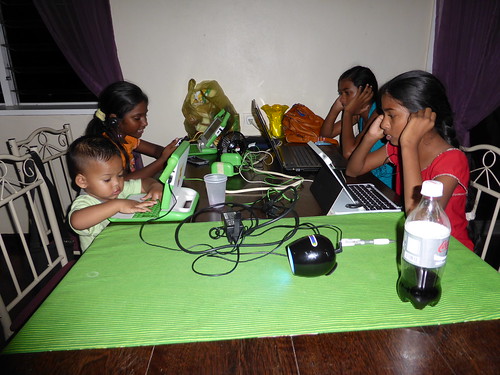Not All Who Wander Are Lost
Coursera vs. Connected Courses – Week 1
I started two online courses this week and the difference between their approaches is huge! One is very teacher oriented with a list of steps and tasks while the other is very open-ended with a large amount of tinkering is expected for facilitators and participants alike.
Coursera
Friday evening after the first full week back at school it was time to get started with my Coursera course: Powerful Tools for Teaching and Learning – Digital Storytelling. I started by watching the requisite videos.

The instructor was well spoken and seemed to enjoy the content. The videos were easy to follow and not too long. It was obviously well-rehearsed and scripted. It was all quite straight-forward so I spent some time focusing on the techniques being used since I assume that these will be similar to those they are planning to teach us. Over the course of about 20 minutes, the instructor talked about types of digital stories, a digital storytelling process, how digital storytelling can be used in the classroom and shared work of previous students by way of example.
I then clicked on the two documents listed under Reading Materials. I only skimmed them since they were clearly the source for the content in the videos and didn’t offer much additional information.
Then, as a dutiful student, I followed our instructions and introduced myself in the Discussion Forum. As I read other posts in the forum I was impressed with the spectrum – there are a large participants from a wide variety of countries. It was a little overwhelming to figure out which posts to read on the 15 pages of introductory forum posts – should I look for people in my geographic region? should I look for people with similar jobs? should I try to find people with similar interests?
This week’s assignment is to identify and share a topic for a digital story I plan to work on. I’ll need to get that determined by tomorrow.
Just as I was beginning to feel somewhat underwhelmed with the introductory content and course experience I came across a link to IndieWire shared by Joanne Ritter about Michael Moore’s 13 Rules for Making Documentary Films. A golden nugget!

Connected Courses
Saturday afternoon I thought that I should get started with Connected Courses. I viewed the first Blog Talk video and what a contrast to Coursera! I had no idea where the video was headed but I was engaged by the conversational nature for the full hour! The direction of the course was laid out but not as a series of steps. We were encouraged to just try things and not worry about making mistakes, reflect on our learning and help others along the way. The instructors are clearly along for the ride and are also learners. Not everything worked perfectly in the broadcast but they easily moved on and it didn’t take away from the learning experience. I have no assignment to complete and can look at what other participants are writing on their blogs if I feel like it or I could follow the #ccourses hashtag on Twitter.

Why is the Meandering Path of Connected Courses so much more engaging to me than the Straight Line Coursera?
In the Connected Courses Blog Talk they explained WHY they thought this course will be important. Maybe because of my previous experience with ds106 and my job as an ICT Integrator, Coursera seems a bit easy but Connected Courses seems to be in my Zone of Proximal Development and I think their reasons for taking this course fit with my own beliefs and desires. Or maybe it was just the collaborative nature of the way the course has been planned and is expected to unfold that makes it appealing. Although it is expected that we will have difficulties I also think that there is an expectation that we will support one another and I know that there are many people around who can help .
Coursera seemed to focus on WHAT. The steps are clearly laid out and many posts in the discussion forum are focused on what the steps are and when to do them. But it was difficult to find the “personality” in the the course. I have no doubt that I will end up with some kind of a digital story at the end of the Coursera course and I am hoping that I can push the intended boundaries by working collaboratively with some friends in other countries. After poking around in the discussion forum, I gave up and went back to a friend’s Facebook post – she had told me about the course in the first place and knew a few other people who might want to participate. So I contacted them to see if they wanted to work together, “break the rules” and work on something collaboratively.
The adventure of trying to reach a destination knowing that there is just a vague plan for how to get there rather than a series of checkpoints along the way means that I can take side trips and explore what really interests me. Just like when I travel, I am happy to be able to have some control in what I do each day and not have it all planned out by someone else. I know that this isn’t for everyone but I am really looking forward to the Connected Courses journey!

I think it will be great if you document your two paths, showing where both courses come together and where they diverge. Interesting.
Kevin
I think your title, All Who Wander Are Not Lost, pretty much says it all. I agree with you that the wandering is more than 1/2 the fun and leads to the majority of my learning.
Your post makes me wonder about the connection between direction and wandering. Is there one? Do you have to be motivated, or unmotivated to wonder? “(A) Personal Learning Network refers to the network of people a self directed Learner connects with for the specific purpose of supporting their learning needs.” Rajagopal, Verjans, Sloep & Costa (2012) – how does “self-directed” relate to direction, motivation and wandering and the way people learn?